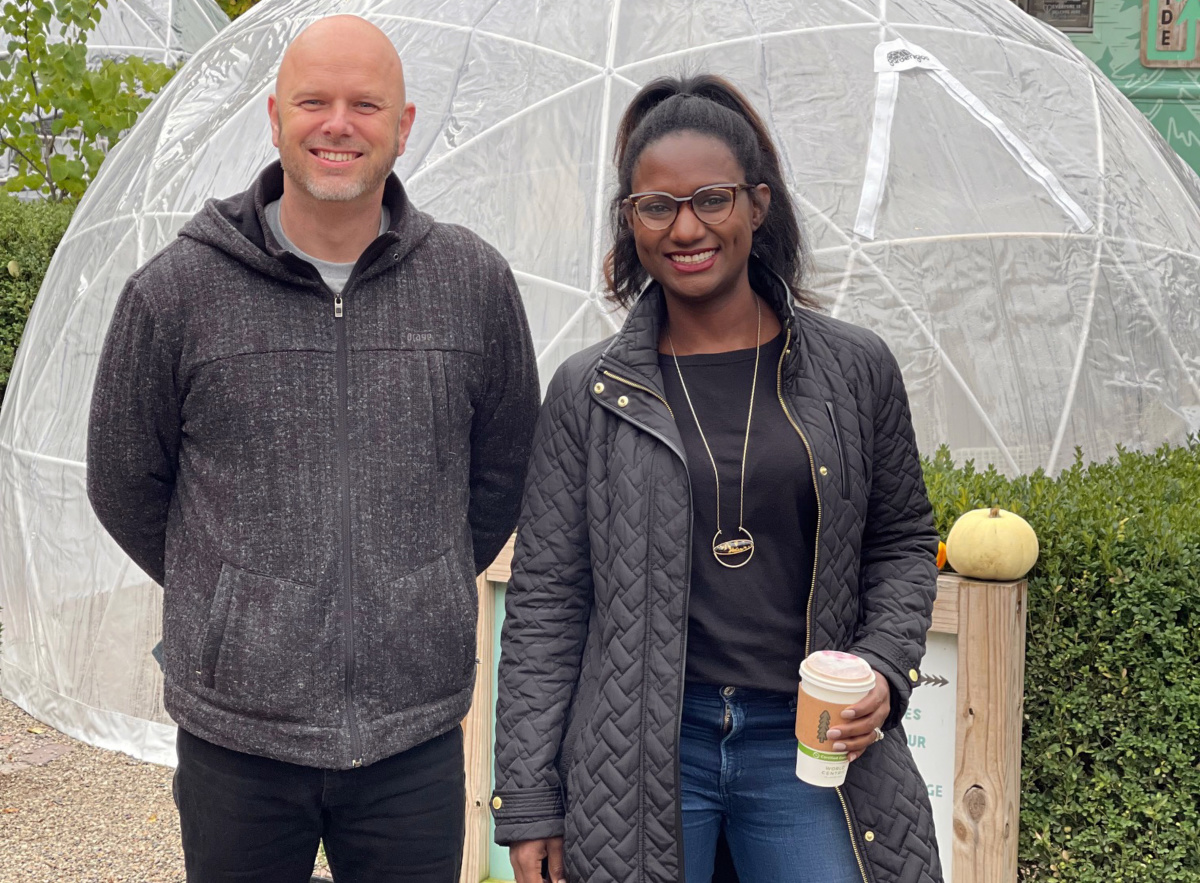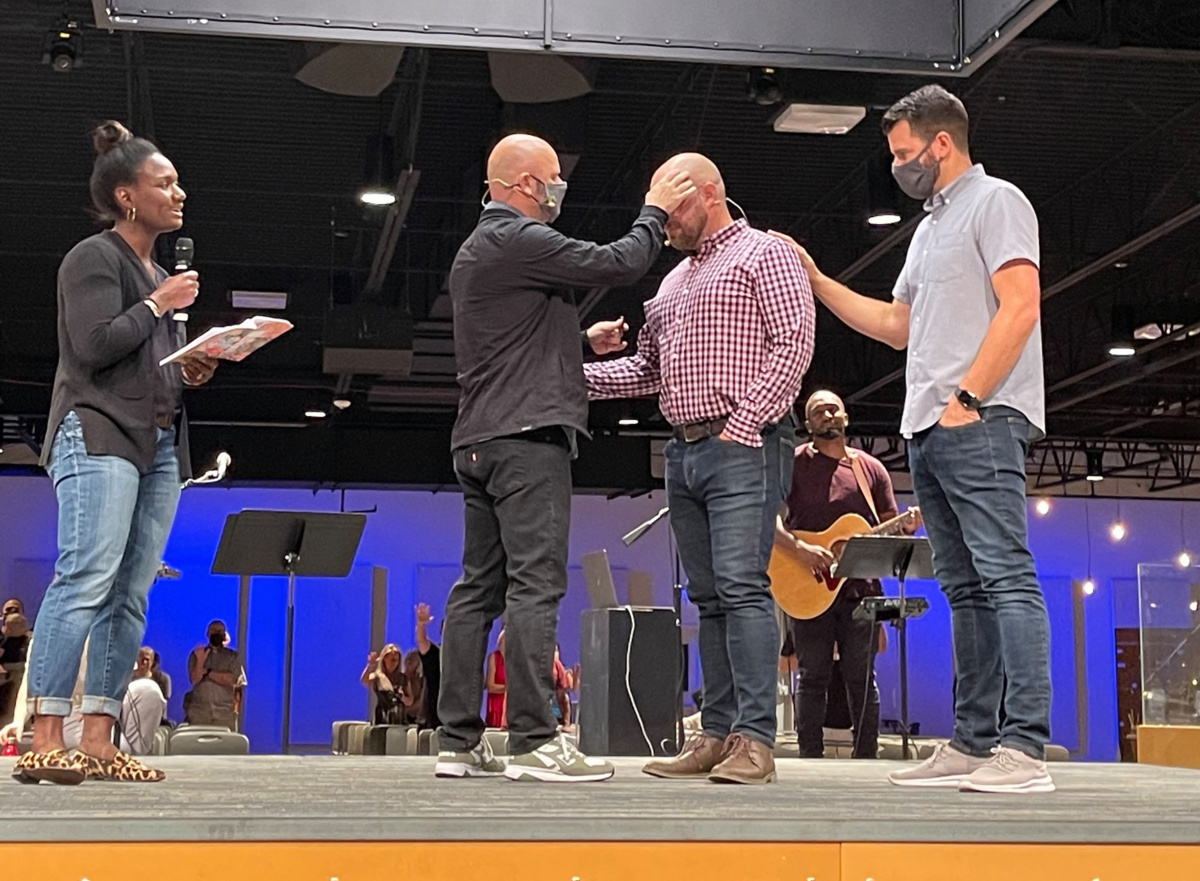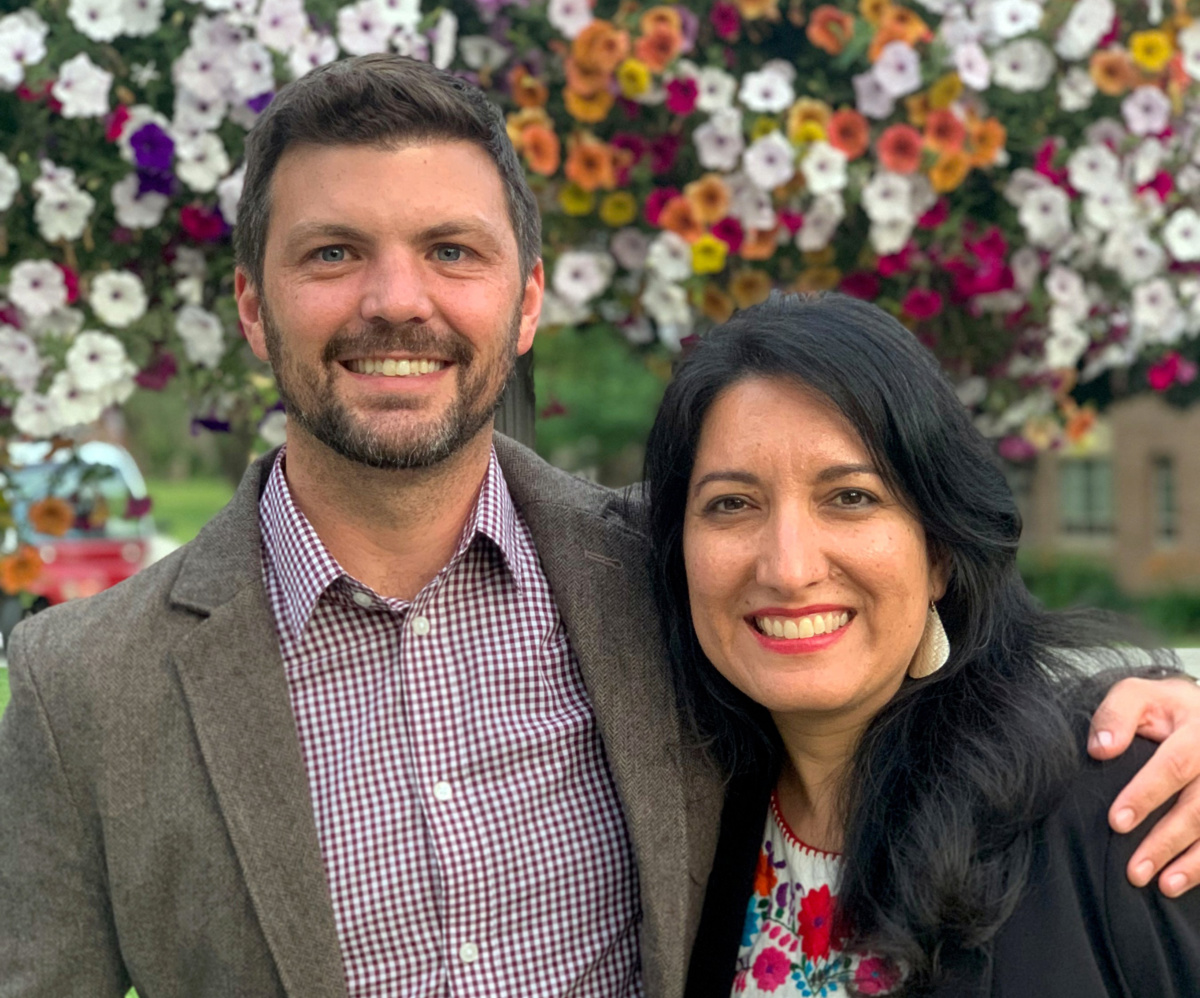
BOB SMIETANA, of Religion News Service, looks at how some churches – including Mars Hill Bible Church in Grandville, Michigan, are adopting a co-pastoring model…
One of the biggest religion stories of 2021 in the US has been the saga of the now-shuttered Mars Hill Church in Seattle and the downfall of its controversial celebrity pastor Mark Driscoll, detailed in a popular podcast that’s been downloaded more than 13 million times.
A lesser-known but noteworthy story has been playing out at Mars Hill Bible Church in Grandville, Michigan. Once also led by a celebrity pastor, the church is charting a different course forward, moving from a leader-centric model and installing instead this past summer two co-pastors: Ashlee Eiland and Troy Hatfield.

Mars Hill Bible Church co-pastors Troy Hatfield, left, and Ashlee Eiland. PICTURE: Courtesy photo
Eiland, who is Black, and Hatfield, who is white, are the first co-pastors in the church’s history, while Eiland is also the first woman to serve at Mars Hill as a senior pastor.
The two had been serving as part of an interim leadership team at the church since the departure of AJ Sherrill, the former senior pastor, in August, 2020. Hatfield is a longtime staffer at Mars Hill, having joined the church as a worship leader in 2004 when it was one of the fastest-growing churches in the country under founding pastor Rob Bell. Eiland was called to the church in 2019 to launch a new campus of the church in nearby Grand Rapids.
“I was really inspired by the idea. It felt well-discerned and prayed through – and we had the advantage of having done some co-leadership before.”
– Ashlee Eiland, speaking of the idea of co-pastoring Mars Hill Bible Church in Grandville, Michigan.
For both, the role of senior leader came as a surprise. Eiland said in the churches she’d grown up in, women didn’t serve in top leadership roles. Hatfield said he’d never aspired to be a senior pastor. But after serving together on an interim basis, they embraced the invitation from the Mars Hill elder board to become co-pastors.
“I was really inspired by the idea,” said Eiland. “It felt well-discerned and prayed through – and we had the advantage of having done some co-leadership before.”
Having co-pastors at a church or other congregation is rare. The 2012 National Congregations Study found 94.5 per cent of congregations have one person serving as senior leader. The 2020 Faith Communities Today Study found that five per cent of congregations have two or more clergy who share leadership equally.
Eiland and Hatfield said they are still fine-tuning what it means to lead as co-pastors. For now, they split preaching duties, while each oversees one of the two locations where Mars Hill worships, with Eiland in Grand Rapids and Hatfield in Grandville. They also team up on bigger-picture planning for the church.
As co-pastors, the two have been charged with helping Mars Hill find its way forward – a task made more complicated by the ongoing COVID-19 pandemic. The church was founded in the late 1990s, using what’s known as an attractional model of ministry, centered on Bell, a charismatic communicator who could draw huge crowds. By the time Hatfield had arrived on staff, the church had more than 10,000 people for weekend services.
Since Bell’s departure in 2012, the church has had a series of fairly short-tenured senior leaders and has shrunk in size. Today, about 1,200 people attend in-person and online services, though it is hard to tell how many people are part of the church because of the pandemic.

Co-pastors Ashlee Eiland, from left, and Troy Hatfield lead a service at Mars Hill Bible Church in Grandville, Michigan, in September, 2021. PICTURE: Courtesy photo
Mars Hill has also been rethinking its identity in recent years.
“In the past 18 months, the consideration for Mars Hill has been, how do we faithfully be a local church?” said Hatfield.
Starting a new campus in Grand Rapids is helping with the transition. That location is essentially a church plant, said Eiland, and is in a residential neighborhood, which makes it different from the Grandville campus, located in a former mall. The new campus is in a place where people live, while the older location is a place people drive to, said Hatfield. That difference in geography, Eiland said, will reshape the church, helping make it more congregation-centered and less leader-centered.
“I think we’re going to discover new ways of being this church,” said Eiland.
For his part, Hatfield said he has always been drawn to a parish model of ministry, where the clergy have a close connection to their congregation and their community. He is also careful how he describes the church, trying to stay away from any sense of ownership on his part as a leader.
“This is not my church,” he said. “This is Christ’s church. And I have been invited to help lead Christ’s church.”
Mark McCloskey, professor of ministry leadership at Bethel Seminary in St Paul, Minnesota, said collaborative ministry – like co-pastoring – has a number of benefits. Having more than one leader means power isn’t all concentrated in one person. It also means all of the burden of running a church doesn’t fall on one person.
More than that, he said, shared leadership was a common practice in the Bible.
“In the New Testament, you’d have to look long and hard to find a model where there’s a sole senior pastor,” he said. “Basically, you’d have a plurality of leaders.”
That model can make space for different viewpoints and perspectives. But it is not easy, said McCloskey, who runs a program on transformational leadership. Pastors who think they need to have all the answers, for example, have difficultly sharing power.
“I tell my classes, you have to have somebody who can be in charge without being in control, who can be present without casting a shadow,” he said.
We rely on our readers to fund Sight's work - become a financial supporter today!
For more information, head to our Subscriber's page.
When she was first interviewed at Mars Hill, Eiland said, she was asked to describe a leader who had inspired her to walk with Jesus. The first person who came to mind was her grandmother, who taught her how to pray, how to love the Bible and how to have a faith that was not just in her head or her heart but was lived out in her day-to-day life.
“Character matters,” she said. “People are watching you. Not just who you are at church or on a platform on Sunday morning, but who you are to your neighbor, who you are to the construction person working on your yard, who you are to the person at the grocery store. All of that matters.”
Eiland was quick to admit she remains a work in progress and has much to learn. But the importance of striving to live out her faith remains at the top of her mind. What good will her ministry be, she said, if it doesn’t shape her into the person God wants her to be?

The Church We Hope For co-pastors Bobby Harrison, left, and Inés Velásquez-McBryde in Pasadena, California. PICTURE: Courtesy photo
Two thousand miles away, in Pasadena, California, Inés Velásquez-McBryde and Bobby Harrison, co-pastors of The Church We Hope For, a multi-ethnic start-up congregation, are also charting a way forward as leaders during the pandemic.
The church began as a house church in January, 2020, paused during the early months of the pandemic, then rebooted on as an online community when it became clear the pandemic would not end any time soon.
Velásquez-McBryde described the church as a healing place for people who have been hurt by the church in the past but who still hope to find the kind of beloved community found in the Bible. On a recent Sunday, she greeted worshipers by name as they joined the Sunday Zoom call, chatting with them while waiting for the service to begin and reminding folks not to spill coffee on their living room rugs at home.
“We’re going to miss this one day, you know, when we are in person again,” she said.
Harrison also chimed in, recalling the potluck after a recent in-person gathering. The two pastors, who are longtime friends, lead the Zoom meetings together and take turns preaching week by week. They hope their shared leadership reinforces the message they preach.
“We aim to be an embodied witness of the good news — that men and women can serve side by side and worship side by side and lead side by side,” he said.
The co-pastors said their ministry partnership has been a blessing during COVID, which has made the hard work of starting a new congregation even more challenging. Leading a new church during COVID as a solo pastor would have been daunting, they said.
Co-pastoring can be a healthy model for church leaders but also for the congregation, said Juliet Liu, co-lead pastor of Life on the Vine Church in Long Grove, Illinois, which has had co-pastors for most of its history. A shared leadership model shows that in the kingdom of God, power is meant to be used for the benefit of all, she said. “When we are entrusted with power and authority, it’s not so one person can keep it for themselves,” she said. “It’s actually shared so that it can be exercised on behalf of everyone.”
Liu said it is also crucial for co-pastors to have a strong friendship and trust. Otherwise, their partnership can lead to conflict.
Velásquez-McBryde likes to use the term “re-creating” when talking about the mission of the church, pointing back to the story of the Garden of Eden in the Book of Genesis. In the garden, she said, there was “harmony, not hierarchy,” and the idea of a hierarchy comes after the fall. Addressing those power inequalities is important — not just between men and women but also between people from different ethnic backgrounds.
Otherwise, she said, all you have is “presence without power.”





